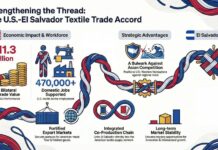New Delhi, April 10 – The Confederation of Indian Textile Industry (CITI) announced on Thursday that the recent 90-day relief from US reciprocal tariffs will provide temporary relief for Indian textile and apparel exporters, who were preparing for increased tariff challenges. They are urging the government to establish an interim Textile Exports Protection Scheme to support the Indian textile export relief efforts.
US President Donald Trump has declared a 90-day ‘pause’ on reciprocal tariffs, excluding China. During this period, a significantly reduced reciprocal tariff of 10 percent, in addition to the current duties, fees, taxes, and other applicable charges, will be enforced.
“The temporary relief will bring short-term respite to Indian textile and apparel exporters, who were bracing for higher tariff barriers. However, this measure is only a stopgap. It is crucial that the government of India intensifies its engagement with US counterparts to arrive at a more sustainable and mutually beneficial solution,” said CITI Chairman Rakesh Mehra.
Emphasizing the significance of the US market, Mehra mentioned that the United States is the largest destination for Indian textile and apparel exports.
“While the government is actively pursuing bilateral negotiations for better tariff access, the industry urges the government to consider introducing an interim Textile Exports Protection Scheme,” he added.
Such a scheme would help alleviate the burden of additional tariff costs, especially given the slim profit margins that textile and apparel exporters operate within.
Mehra further noted that the ongoing trade disputes between the US and China present a strategic opportunity for India.
“With the US looking to diversify its sourcing away from China, India has the potential to emerge as a reliable alternative,” he emphasized.
According to the latest figures, India exported textile and apparel products worth $10.5 billion to the US in 2024, representing approximately 28.5 percent of India’s total textile and apparel exports.
Over the past five years, India has been a relatively preferred partner for the US in this sector, making the need for robust Indian textile export relief measures even more critical.

































